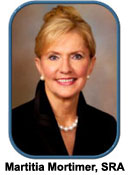ELLIOTT® RECRUITING APPRAISERS FOR COMPLEX PROPERTIES
 The recent surge in demand for appraisals and other services
involving complex properties has created a need for ELLIOTT® &
Company Appraisers to expand its appraisal force and enact more
working agreements with appraisers with more experience, general
certification and prestigious designations, including MAI, SRA
and ASA. The recent surge in demand for appraisals and other services
involving complex properties has created a need for ELLIOTT® &
Company Appraisers to expand its appraisal force and enact more
working agreements with appraisers with more experience, general
certification and prestigious designations, including MAI, SRA
and ASA.
“We are proud of the force of certified and
licensed appraisers our company has been using,” said Charlie
Elliott, president of ELLIOTT® & Company Appraisers. “These
appraisers have enabled ELLIOTT® to grow to a national company
and continue to expand from that milestone and we plan to
continue working with these appraisers. Now, as more and more
companies are learning to rely on us to perform difficult
assignments, we, in turn, need to find more appraisers
throughout the United States who have the ability to help us do
so.”
Appraisers interested in working with ELLIOTT® on
complex assignments are encouraged to send a resume to
hr@elliottco.com.
FOREIGN PURCHASES OF U.S. REAL ESTATE
INCREASES DRAMATICALLY
According to the National Association of Realtors (NAR) $82 billion
was spent on U.S. real estate by foreign buyers in the one-year
period, which ended last March. That’s $16 billion more than the
amount foreigners spent on real estate in this country in the
previous 12-month period.
The NAR credits the surge in such
real estate activity to more foreign college and university student
in the country and more executives throughout the world working in
the United States. The organization has historically credited the
foreign interest in American homes to desirable home pricing
(compared to that in other countries, even before the real estate
meltdown), opportunity to rent the home and long-range potential for
increase in value.
“The U.S. has always been a desirable
place to own property and a profitable investment,” said Ron Phipps,
president of NAR. “In recent years we have seen more and more
foreign buyers coming here to take advantage of low prices and
plentiful inventory.”
The average price paid by a foreigner
for a U.S. home was $315,000, significantly higher than the average
American home price of $218,000, the NAR reported.
“Besides
the strength of the dollar and the general economic trends in the
U.S., international buyers are also recognizing the benefits of home
ownership in this country, especially in the case of recent
immigrants,” Phipps added. “Many foreigners perceive owning a home
here as an important accomplishment in their efforts to become
established in this country.”
KANJORSKI SAYS MORE APPRAISAL
REGULATION SHOULD COME
 Former
U.S. Congressman Paul Kanjorski took aim at the appraisal and
credit-rating industries, during the Global Technology Summit 2011
in Las Vegas, and alleged that these industries were a significant
cause of the mortgage meltdown that reached a climax in 2008.
Kanjorski, who represented Pennsylvania’s 11th District in Congress
from 1985 until 2011 and rose to chairman of the Subcommittee on
Capital Markets, Insurance and Government Sponsored Enterprises,
said that credit ratings agencies played a major role in creating
the situation that led to the economic collapse. The once-powerful
Congressman who was defeated for re-election last November, called
credit ratings agencies “an abomination,” according to a report in
National Mortgage News. He said they, as well as the appraisal
industry, need in to be further regulated. Former
U.S. Congressman Paul Kanjorski took aim at the appraisal and
credit-rating industries, during the Global Technology Summit 2011
in Las Vegas, and alleged that these industries were a significant
cause of the mortgage meltdown that reached a climax in 2008.
Kanjorski, who represented Pennsylvania’s 11th District in Congress
from 1985 until 2011 and rose to chairman of the Subcommittee on
Capital Markets, Insurance and Government Sponsored Enterprises,
said that credit ratings agencies played a major role in creating
the situation that led to the economic collapse. The once-powerful
Congressman who was defeated for re-election last November, called
credit ratings agencies “an abomination,” according to a report in
National Mortgage News. He said they, as well as the appraisal
industry, need in to be further regulated.
The former
Congressional leader revealed that, as the crisis was brewing in
September 2008, members of Congress, Federal Reserve officials and
Treasury Department leaders sought consultation from 40 Nobel
prize-winning economists, according to the National Mortgage News
article.
“The clear consensus of all 40 was that, if we
failed to act, then the American market would fail and within 72
hours, the entire world Market would have failed,” Kanjorski said.
He also revealed that a military unit based in North Carolina
was on standby in case of riots or other chaos in Washington.
Kanjorski did not rule out the possibility of Fannie Mae and
Freddie Mac rebounding to the point that they could repay the
government all the money used to bail them out and might even become
private companies again. He also noted that the federal government
is holding serious talks of consolidating them with FHA. Active in
the creation and passage of the Dodd-Frank Act, Kanjorski admitted
that the new law has its weaknesses.
“We did not do a perfect
job,” Kanjorski told his audience of Dodd-Frank. “But there was not
a perfect job that could be done.”
FORECLOSURE CRISIS STILL HAS A LONG WAY TO GO
 As
reports are coming out that foreclosures are subsiding, a highly
recognized economic expert has warned that plenty of foreclosures
are on the horizon. As
reports are coming out that foreclosures are subsiding, a highly
recognized economic expert has warned that plenty of foreclosures
are on the horizon.
“If the national foreclosure crisis were
a baseball game, we would be in about the top of the sixth,” wrote
John Schoen, senior producer at MSNBC. “And we may have to go to
extra innings.”
These somber words came from an article
Schoen recently wrote for msnbc.com, entitled “Foreclosure flood may
not have crested yet.” In the article, Schoen backed up his opening
statement by saying that there had been 6.5 million homes foreclosed
upon since 2006 and that, according to the Mortgage Bankers
Association, 4.3 million homes were owned by “seriously delinquent”
borrowers. Schoen credited the current ease in foreclosure activity
to increased paperwork by lenders in the wake of the
recently-revealed robo-signing activity.
“When those
foreclosures occur, they will create another wave of ‘distressed’
sales as banks move quickly to move those properties off their
books,” the article continued. “Distressed sales have been the major
force pushing home prices lower.”
CRAFTY NAMING OF SUBDIVISIONS CAN INCREASE
THEIR
PROPERTIES’ VALUES
A study conducted by economists at the University of Georgia
concluded that naming subdivisions with certain words actually
increased prices of homes in these developments. An article written
on this study by Catherine New of Huffington Post Media Group
reported the study, which tracked MLS data in Baton Rouge, La.,
concluded that the words “Country Club” in a subdivisions name could
attract an extra 5.1% from buyers of property in the subdivision and
just the word “country” in the name fetched an extra 4.2% under the
same circumstances.
Other words that seemed to boost
property value in subdivisions, according to the article, published
by AOL Real Estate were “pleasant,” “acres,” “hills,” “estates,”
“ridge” and “heights.”
HOME PRICES RISING IN SOME CITIES; FALLING IN MOST
 As
the national average home price continues to fall, some metropolitan
areas are actually experiencing average home price gains. According
to Federal Housing Finance Agency (FHFA) figures, the following
metropolitan areas had the biggest average home-price gains from the
fourth quarter of 2009 to the fourth quarter of 2010. As
the national average home price continues to fall, some metropolitan
areas are actually experiencing average home price gains. According
to Federal Housing Finance Agency (FHFA) figures, the following
metropolitan areas had the biggest average home-price gains from the
fourth quarter of 2009 to the fourth quarter of 2010.
-
San Jose, Calif.
-
Honolulu
-
Pittsburgh
-
Fort Myers, Fla.
-
Bethesda-Frederick-Rockville, Md.
-
Fort Wayne, Ind.
-
Buffalo, N.Y.
-
Oklahoma City
-
Boston
-
San Antonio
Meanwhile, the FHFA listed the following metropolitan areas for
experiencing the largest percentage drops in home prices during the
same time period.
-
Reno, Nev.
-
Boise, Idaho
-
Lakeland-Winter Haven, Fla.
-
Phoenix
-
Orlando, Fla.
-
Jacksonville, Fla.
-
Braden-Sarasota, Fla.
-
Pensacola, Fla.
-
Tampa-St. Petersburg, Fla.
-
Tacoma, Wash.
 ASK
MARTITIA ASK
MARTITIA
QUESTION:
A potential client tells an appraiser that if he cannot appraise a
property for a certain amount, he must decline the assignment. Does
USPAP allow an appraiser to accept such an assignment?
MARTITIA:
No. According to the Uniform Standards of Professional Appraisal
Practice, an appraiser must decline any assignment that requires any
of the following characteristics:
-
The requirement of a
predetermined opinion of value.
-
The direction in
assignment results that benefit the client.
-
A minimum amount for
the opinion of value.
-
A stipulated result,
such as a loan closing, after the appraisal.
-
A subsequent event
which occurs as a result of the appraiser’s opinion of value.
Martitia Mortimer, Elliott's
executive vice president, answers appraisal questions on a regular
basis in Elliott Evaluation News.
QUOTES
 "It
is very easy to accuse a government of imperfection, for all mortal
things are full of it." – Michel de Montesquieu "It
is very easy to accuse a government of imperfection, for all mortal
things are full of it." – Michel de Montesquieu
"Ambition is the germ from which all growth of nobleness proceeds."
– Thomas Dunn English
"Propaganda does not deceive
people. It merely helps them deceive themselves." – Eric Hoffer
"Distrust anyone in whom the impulse to punish is powerful."
– Friedich Nietzsche
"A man who gives his children
habits of industry provides for them better than by giving them a
fortune." – Richard Whately

 |
| |
| Newsletter Editor:
kevin@elliottco.com
|
| |
|
3316-A Battleground Avenue
Greensboro, NC 27410 |
Toll Free 800-854-5889
Fax
336-854-7734 |
| |
|
|
To unsubscribe from our mailing list, please
click here. |
|









